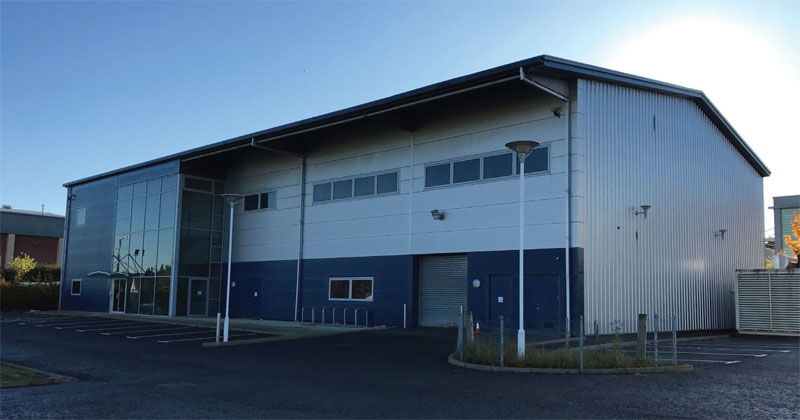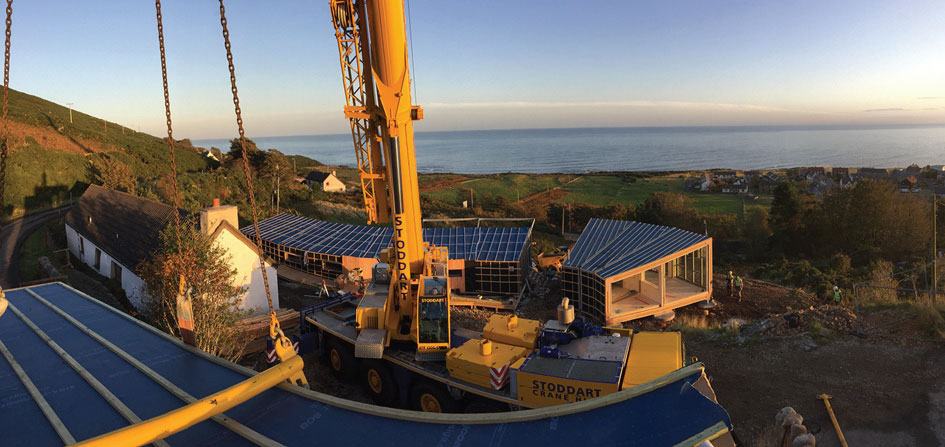New Timber Research Facilities at Edinburgh Napier University
15 February 2017A new three million pound Timber Research facility is to open at Edinburgh Napier University. Professor Sean Smith BSc, PhD, FIOA, FRSA, HONFRIAS, Professor of Construction Innovation and director of the Institute for Sustainable Construction at the university, explains how the new unit will work closely with the panel industry on research and development and how the future is bright for off-site wood panel housing construction, not just in the UK but globally.
The increasing specification of timber building designs in the UK highlights an important step forward for the timber and wood panel sector.
To support the increasing growth of this market, and to push forward new developments in construction product innovations, Edinburgh Napier University recently announced a three million pound investment in new research laboratories for timber construction as part of the Institute for Sustainable Construction (ISC).
The university has worked closely with UK, European and global partners in timber technologies, wood science and timber engineering over the last 14 years since the first specialist timber research centre was formed in 2003.Encompassing experts in timber engineering, product development, timber strength-grading and new panel systems, the university’s positive impact on industry, society and rural economies was recognised in 2015 with the award of the Queen’s Anniversary Prize.
A specific aspect of this award was the substantial development by ISC experts in new wood based product innovations, engaging with multi-national and SME (small and medium enterprise) partners, with strong support from Forestry Commission Scotland.
The facilities at the university will provide opportunities for non-destructive strength-grading using acoustic techniques, specialised conditioning chambers, structural testing equipment, racking rigs for panels and the opportunity to construct and test off-site closed panel and modular units.
The ISC expert staff serve on Scottish, UK, European and international standards committees and have research and knowledge exchange relationships with over 45 countries.
Developments in acoustic strengthgrading techniques, led by Dr Daniel Ridley-Ellis who leads the Centre for Wood Science and Technologies at ISC, were recently recognised through the ‘UK Woodland Hero of the Year’ award for 2016.
His research team’s work has led to significant improvements and accuracy of measuring strength-grading and the benefits this brings to the forestry and sawmill sectors.
New Panel Innovations
ISC is currently supporting a number of innovative companies to develop high performance, low energy, panel systems, which from early testing have shown an energy efficiency ‘fabric’ improvement of over 70% versus existing housing.
Much of the analysis on new timber panel systems has been led by Professor John Currie, head of the Scottish Energy Centre based within ISC. The ‘fabric first’ approach, which was a key strategy of ‘Wood for Good’ and the Structural Timber Association, in partnership with industry members, is now bearing fruit in relation to the timber sector’s advanced energy performance for the building envelope. The government drive to improve energy performance, increase sustainability measures and support the circular economy has resulted in many UK house builders refocusing towards future timber panel systems and in particular off-site construction. This bodes well for the timber and wood based supply chains, given the scale of housing demand and requirements across the UK.
As part of the new wood based panel systems R&D, a strategic focus on extending material life span, increased protection of materials from moisture during construction (highintensity rainfall) and enabling technical compatibility for high sustainability standards are being engaged. The shortage of brick supplies and site labourers has also led to new innovations in insulated external panels, increased specification of timber cladding and new approaches to circular economy future deconstruction ambitions.
New industry partnerships have developed, bringing some of the key experts together from industry supply chains to develop composite solutions. ISC has developed strong working partnerships with key leading companies, including Stewart Milne group, Donaldson’s Timber Engineering, Oregon Timber Frame, SmartPly, ITW-Cullen, Carbon Dynamic and Russwood.
Housing Demand and Brexit
Whilst there have been previous moves to grow off-site construction in the UK, recent activity suggests that this time off-site is ‘here to stay’ and will expand significantly in the coming years. There are a variety of drivers for this but ultimately it is the factors of on-site skills shortages, circular economy drivers, and housing demand and supply issues which are underpinning this shift towards more off-site construction.
Over the next 20 years the UK would have to build over 230,000 homes per year to meet existing and expected demand.
This is due to population growth and change in household sizes, which have shifted from 2.6 towards 2.1 persons per household in parts of the UK. Edinburgh is one of the key cities in this. It will see the fastest and largest increase of any Scottish city and will be the fifth fastest growing city in the UK. While the rest of Scotland increases by 8% over the coming 20 years, Edinburgh will grow by 28%. This will place significant pressures on new housing, infrastructure, education and health provision.
However, it also provides an opportunity for the south east of Scotland and the six local authorities in this region to partner and support this significant change. Forecasts estimate that over 145,000 new homes will be required in this region over the next 20 years.
As a result, there are plans for a future City and Regional Deal proposal to the Scottish and UK government to invest over £700m in new housing. It is likely that the majority of new housing will be timber panel based, using off-site construction methods and delivering some of the most sustainable housing built in the UK. Thus the new ISC timber research facilities, and investment by Edinburgh Napier University, are supporting a timely and strategic phase for this region’s growth and development.
The potential issues with Brexit and resultant future changes are also resulting in a stronger push for more off-site construction. At present, 12% of the UK construction workforce is from Europe and in London 35-50% of site workers are from Europe. If a large proportion of European workers decide to leave the UK, this would impact significantly on new housing output and overall supply. The construction industry and the Scottish and UK governments are currently assessing the full implications and it is likely that the driver for using more off-site construction will become stronger. Recently, committees of the UK parliament have called for evidence on the implications and their report is due shortly.
Growth in companies, and membership of trade bodies such as BuildOff-site, demonstrate the shift in industry plans and future investment direction. A new Scottish Off-site Hub involving multiple industry partners was developed by Dr Robert Hairstans, head of the centre for Off-site Construction, based within ISC.
Global Changes
Globally over the next 20 years there will be over US$100 trillion in investment in buildings, infrastructure and transport. With material shortages and rising costs in competitor sectors, and the significant push for higher and better sustainability standards such as the UN Sustainable Development 17 objectives, this marks a key change in global and government directions.
Circular economy drivers and the global population rising to 11.4 billion by 2100 will require over 2.4 billion new homes to be built in the next 83 years. Whilst this lays down a significant task for governments and industry to deliver, it also provides opportunities for significant future growth for the global timber and wood panel based industry.
Thus the development of the new ISC research facilities for timber and wood based systems, due for completion in May 2017, provides one of the key future R&D gateways to support and develop new innovations with industry partnerships on a global platform.

